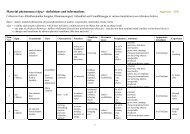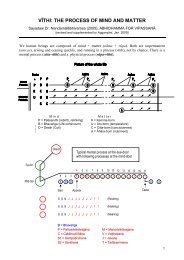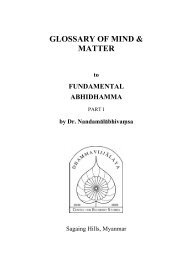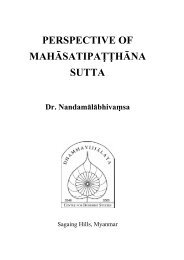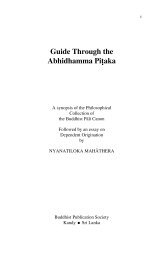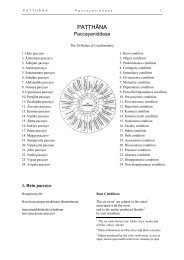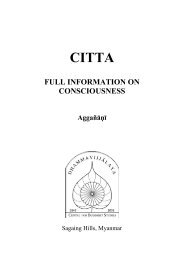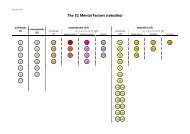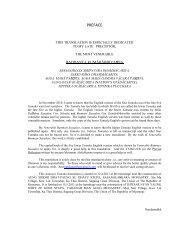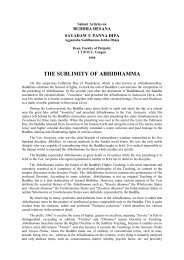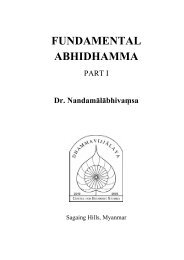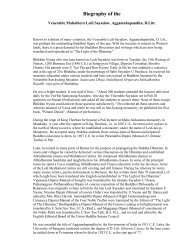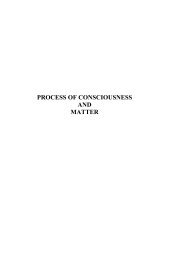ABHIDHAMMA IN DAILY LIFE - Abhidhamma.com
ABHIDHAMMA IN DAILY LIFE - Abhidhamma.com
ABHIDHAMMA IN DAILY LIFE - Abhidhamma.com
You also want an ePaper? Increase the reach of your titles
YUMPU automatically turns print PDFs into web optimized ePapers that Google loves.
a. Buddha's meritorious deed and perfections in his past existences, which serves as the cause of<br />
Enlightenment.<br />
b. The result of Buddha's past merit.<br />
c. The infinite benevolence the Buddha brings to all sentient beings.<br />
6.9.a . Buddha’s meritorious deeds - The Cause<br />
The cause means the fulfillment of perfections in countless past lives. He performed meritorious<br />
deeds and practiced parami perfections with the greatest vigor. His noble deeds throughout the<br />
cycle of samsara are not for himself, but for the deliverance of all living beings from suffering in<br />
the samsara. Let us, for example, recall the performance of Charity parami of King Vessantara,<br />
the Bodhisattva.<br />
Example - Most people give charity for be<strong>com</strong>ing famous as a great donor. They even feel they<br />
are benefactors of the recipients who should be grateful to them and show their gratitude if<br />
possible. They hope for rebirth in luxurious abodes. They wish for attainment of Nibbána only<br />
perfunctorily. As for King Vessantara, he asked his mother when he was only days old to give<br />
him something to donate by presenting his open alms to his mother. As an infant he had no<br />
selfish purpose at all. He only has an ardent desire to give charity in conformity with his latent<br />
habit - vasana.<br />
Accordingly he gave away his jewelry and costumes to his friends. When be became king he had<br />
many charity pandals built and gave feast daily. His daily donations amounted to hundreds of<br />
thousands of money. He enjoyed the bliss of watching people being well fed and well clothed.<br />
He too, he had no selfish desire for fame or good-rebirth. His only purpose was to help others.<br />
He believed that the duty of the rich was to look after the poor. His desire to save the destitute<br />
was intense.<br />
He gave away the Royal White Elephant, causing tumultuous protests from the citizens.<br />
However, Vessantara was heedless of everything else but his wish to attain Omniscience,<br />
Sabbannuta Nana. One might argue that this aim is for his personal gain. However, attainment of<br />
Omniscience meant more arduous work for him as he would have to travel thousands of miles<br />
under various conditions to teach his Dhamma. Therefore, to achieve Omniscience is to serve<br />
the suffering humanity not to achieve his personal gain.<br />
In his final stage of fulfilling parami as King Vessantara, he gave away his son, daughter, and his<br />
queen. This is ample evidence of his selflessness and goodwill for all beings. Let us elaborate.<br />
Having a worthy wife and children is the zenith of pleasures in the luxurious abodes of human<br />
and Devas. Without a wife and children even the Universal Monarch will not find happiness at<br />
all. However, the Bodhisattva King Vessantara renounced the treasures of the heart, his beloved<br />
children and wife, and gave them away. This unparalleled charity was surely not for fame or<br />
wealth, but for the sake of Omniscience by which he could free living beings from suffering.<br />
With such noble and selfless aim, the Bodhisattva sacrificed his own life for the sake of morality<br />
Page 57 A Gift of Dhamma Maung Paw, California



